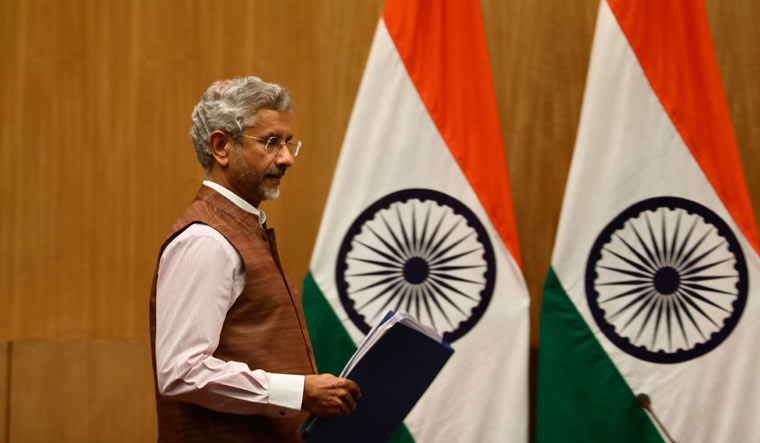External Affairs Minister S. Jaishankar and his Chinese counterpart Wang Yi will have a bilateral meet on the sidelines of the Meeting of Council of Foreign Ministers of the Shanghai Cooperation Organisation (SCO). Confirming the meeting, Russia's deputy chief of mission in New Delhi, Roman Babushkin, said that Russia welcomed every effort and opportunity for dialogue, and multilateral events like SCO and BRICS meets were ideal for having bilateral meets as well.
Jaishankar is heading to Moscow on Wednesday to participate in the SCO meet, on a two-day visit. The Indian government has not confirmed the bilateral with Yi, the press note from the Ministry of External Affairs (MEA) only states that his visit will “include participation in the Council of Foreign Ministers and other bilateral meetings.'' The EAM also has a scheduled bilateral with Russian foreign minister Sergey Lavrov. Babushkin mentioned that a few days ago, the SCO defence ministers' meet gave an opportunity for Rajnath Singh to have a “positive dialogue'' with his Chinese counterpart. “India and China are both respected international players and will find a solution [to their present differences over the border issue in Ladakh],'' he said.
India and China are members of several multilateral and plurilateral organisations like SCO, BRICS and Russia-India-China (RIC). Babushkin, at a virtual press meet, said that at all these fora, bilateral issues cannot be brought up, but the sidelines of the meets gives excellent opportunities for personal interactions. India had recently pulled out of the joint military exercise of the SCO, Kavkaz 2020.
Does friction between member nations affect interactions at these groupings? Babushkin merely said that the reason communicated to them from India was that it was withdrawing because of the pandemic concerns. “We respect the decisions of a sovereign country,'' he said. Russia is the current chair of the SCO, though the chairmanship was to be handed over to India at the Head of State summit, initially scheduled for June in Russia. The meeting was called off because of the pandemic. It is likely to be held sometime soon. India, then, will host the Heads of Government summit of the SCO in November. It is still unclear whether this will be in virtual mode or in a physical format.
India is also the host this year for the India-Russia Summit to be held later this year. Again, it is not clear yet whether Russia president Vladimir Putin will be able to make the visit personally, given the pandemic. India is now number two in the world in COVID-19 cases. “We are very keen that it is an in person summit,'' said Babushkin, while speaking about the complementarity in Indo-Russian ties. He said that a number of deals were in the works for this summit, the most important being the reciprocal logistic support agreement (RLSA), which allows the two countries to access logistical support for their militaries. India has already inked such agreements with the US, France and South Korea and plans to have similar agreements with the UK and Australia, too. The diplomat said that the strength in the relations of the two countries could be understood from the fact that Russia had decided not to supply arms to Pakistan “based on the request and sensitivies of the Indian side.''
He added that Russia was confident of its ties with India and that whatever relations India has with other nations will not be at the cost of Russia. He said that in the Indian Ocean and Pacfic regions, there were a number of emerging strategies, and Russia was ready for them, provided they were in an inclusive and open environment. “But not when these strategies are on the basis of security and that also some mysterious groupings that western nations do. This [such groupings], we feel is to justify their unilateral sanctions and we do not accept attempts to create such security blocs,'' he said, adding that the presence of India and other friendly nations prevented such negative scenarios from developing.
Also read
- Russia says US aims to destabilise India after panel report alleges violation of religious freedom
- Russian plot to murder President Zelenskyy foiled, says Ukraine; 2 colonels arrested
- Amid Xi’s Europe visit, Putin orders military exercise with tactical nukes
- Russia puts Zelenskyy on wanted list; uses a pre-war photo of Ukrainian president



